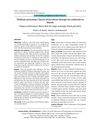11 citations,
January 2017 in “Journal of research in pharmacy practice” The combination of zinc sulfate and calcium pantothenate effectively controls early-stage hair loss.
[object Object]  December 2015 in “Dermatologic Therapy”
December 2015 in “Dermatologic Therapy” Zinc sulfate solution is more effective than tea lotion for treating acne rosacea.
 27 citations,
May 2010 in “Dermatologic Clinics”
27 citations,
May 2010 in “Dermatologic Clinics” Zinc can be a helpful secondary treatment for certain skin conditions, but more research is needed to guide its use.
August 2015 in “대한피부미용학회지” Zinc sulfate may help hair growth.
16 citations,
November 2008 in “Journal of the American Academy of Dermatology” Consider necrolytic acral erythema in similar cases and treat with oral zinc sulfate.
 165 citations,
January 2014 in “Dermatology Research and Practice”
165 citations,
January 2014 in “Dermatology Research and Practice” Zinc is effective for treating various skin conditions, including warts and acne.
 35 citations,
January 2006 in “Journal of Dermatological Treatment”
35 citations,
January 2006 in “Journal of Dermatological Treatment” Zinc can help with some skin problems, but its effectiveness varies depending on the condition.
 30 citations,
June 2006 in “British journal of dermatology/British journal of dermatology, Supplement”
30 citations,
June 2006 in “British journal of dermatology/British journal of dermatology, Supplement” Oral zinc sulphate reduces dark hair color in mice.
 2 citations,
June 2011 in “Journal of clinical and experimental investigations”
2 citations,
June 2011 in “Journal of clinical and experimental investigations” Oral zinc sulphate is an effective and safe treatment for thallium poisoning, especially for skin and hair symptoms.

Early diagnosis and lifelong zinc supplementation are crucial for treating acrodermatitis enteropathica effectively.
[object Object]  June 2011 in “Journal of clinical and experimental investigations”
June 2011 in “Journal of clinical and experimental investigations” Oral zinc sulphate is an effective and safe treatment for thallium poisoning.
 41 citations,
September 2018 in “Australasian journal of dermatology”
41 citations,
September 2018 in “Australasian journal of dermatology” No systemic treatment for alopecia areata has strong evidence of effectiveness.
 13 citations,
June 2020 in “International Journal of Dermatology”
13 citations,
June 2020 in “International Journal of Dermatology” A rare scalp condition mainly in older women can be treated with various alternatives to steroids, which may have fewer side effects.
12 citations,
January 2011 in “Journal of the Saudi Society of Dermatology & Dermatologic Surgery” Thallium poisoning from contaminated cake caused severe health issues in Baghdad, highlighting the need to ban thallium as a rodenticide.
 3 citations,
November 2020 in “Curēus”
3 citations,
November 2020 in “Curēus” A child's hair loss from alopecia areata was fully reversed in five months using diet and supplements.
 January 2023 in “Open journal of pediatrics”
January 2023 in “Open journal of pediatrics” A 7-month-old girl with a rare skin disorder died because diagnosis was delayed.
 112 citations,
July 2008 in “Dermatologic Therapy”
112 citations,
July 2008 in “Dermatologic Therapy” Folliculitis decalvans is a rare scalp condition causing scarring hair loss, treated with long-term antibiotics and other medications, but it often comes back and is hard to manage.
 50 citations,
December 1999 in “British Journal of Dermatology”
50 citations,
December 1999 in “British Journal of Dermatology” Finasteride improves hidradenitis suppurativa but not for child-bearing women.
 March 2011 in “Journal of clinical and experimental investigations”
March 2011 in “Journal of clinical and experimental investigations” Thallium poisoning can cause hair loss, skin rashes, and nerve damage, and can be fatal if not correctly diagnosed and treated.
43 citations,
February 1999 in “Biochemical Journal” Overexpression of SSAT in mice causes hair loss, liver damage, and sensitivity to polyamine analogues.
13 citations,
March 1999 in “Biochemical Journal” Overexpressing SSAT in mice makes them highly sensitive to polyamine analogues, causing liver damage and high mortality.
 65 citations,
January 2009 in “Annals of Dermatology”
65 citations,
January 2009 in “Annals of Dermatology” Zinc supplements increased zinc levels in some hair loss patients but didn't significantly improve hair growth.
 2 citations,
July 2019 in “Journal of psychology & clinical psychiatry”
2 citations,
July 2019 in “Journal of psychology & clinical psychiatry” Zinc helps reduce the severity of depression.
 158 citations,
May 1968 in “The journal of nutrition/The Journal of nutrition”
158 citations,
May 1968 in “The journal of nutrition/The Journal of nutrition” Zinc is crucial for growth and health in rats.
 75 citations,
May 2013 in “Journal of the American Academy of Dermatology”
75 citations,
May 2013 in “Journal of the American Academy of Dermatology” Zinc deficiency in children can cause skin issues and can be serious if not diagnosed and treated properly.
 56 citations,
January 2013 in “International journal of trichology”
56 citations,
January 2013 in “International journal of trichology” Zinc supplements may be needed to treat hair loss in hypothyroidism.
 53 citations,
October 1978 in “Archives of dermatology”
53 citations,
October 1978 in “Archives of dermatology” Zinc supplements can resolve skin issues caused by zinc deficiency.
 14 citations,
August 2016 in “Journal of nanomedicine research”
14 citations,
August 2016 in “Journal of nanomedicine research” Zinc oxide nanoparticle biscuits improved growth and health in zinc-deficient rats without toxicity.
 12 citations,
July 1979 in “International Journal of Dermatology”
12 citations,
July 1979 in “International Journal of Dermatology” A patient with zinc depletion improved after zinc supplementation during parenteral nutrition.
 5 citations,
May 2020 in “Diagnostics”
5 citations,
May 2020 in “Diagnostics” Lower zinc levels may predict less effective hair loss treatment.























